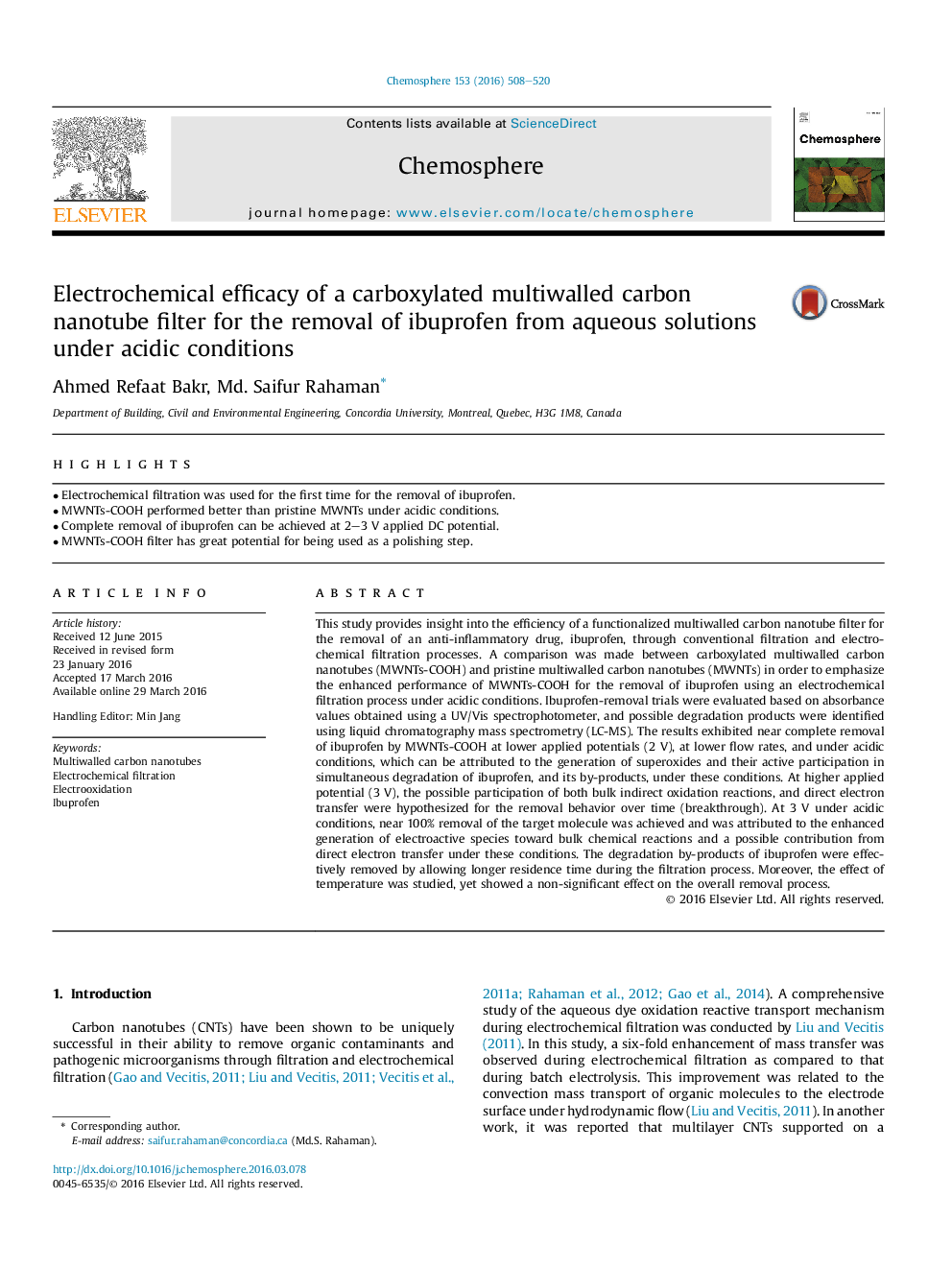| کد مقاله | کد نشریه | سال انتشار | مقاله انگلیسی | نسخه تمام متن |
|---|---|---|---|---|
| 4407684 | 1618818 | 2016 | 13 صفحه PDF | دانلود رایگان |
عنوان انگلیسی مقاله ISI
Electrochemical efficacy of a carboxylated multiwalled carbon nanotube filter for the removal of ibuprofen from aqueous solutions under acidic conditions
ترجمه فارسی عنوان
کارایی الکتروشیمیایی یک فیلتر نانولوله کربنی چند منظوره کربوکسیل شده برای حذف ایبوپروفن از محلول های آبی در شرایط اسیدی
دانلود مقاله + سفارش ترجمه
دانلود مقاله ISI انگلیسی
رایگان برای ایرانیان
کلمات کلیدی
نانولوله های کربنی چند ضلعی، الکتروشیمیایی فیلتراسیون، الکترو اکسیداسیون، ایبوپروفن
موضوعات مرتبط
علوم زیستی و بیوفناوری
علوم محیط زیست
شیمی زیست محیطی
چکیده انگلیسی
This study provides insight into the efficiency of a functionalized multiwalled carbon nanotube filter for the removal of an anti-inflammatory drug, ibuprofen, through conventional filtration and electrochemical filtration processes. A comparison was made between carboxylated multiwalled carbon nanotubes (MWNTs-COOH) and pristine multiwalled carbon nanotubes (MWNTs) in order to emphasize the enhanced performance of MWNTs-COOH for the removal of ibuprofen using an electrochemical filtration process under acidic conditions. Ibuprofen-removal trials were evaluated based on absorbance values obtained using a UV/Vis spectrophotometer, and possible degradation products were identified using liquid chromatography mass spectrometry (LC-MS). The results exhibited near complete removal of ibuprofen by MWNTs-COOH at lower applied potentials (2Â V), at lower flow rates, and under acidic conditions, which can be attributed to the generation of superoxides and their active participation in simultaneous degradation of ibuprofen, and its by-products, under these conditions. At higher applied potential (3Â V), the possible participation of both bulk indirect oxidation reactions, and direct electron transfer were hypothesized for the removal behavior over time (breakthrough). At 3Â V under acidic conditions, near 100% removal of the target molecule was achieved and was attributed to the enhanced generation of electroactive species toward bulk chemical reactions and a possible contribution from direct electron transfer under these conditions. The degradation by-products of ibuprofen were effectively removed by allowing longer residence time during the filtration process. Moreover, the effect of temperature was studied, yet showed a non-significant effect on the overall removal process.
ناشر
Database: Elsevier - ScienceDirect (ساینس دایرکت)
Journal: Chemosphere - Volume 153, June 2016, Pages 508-520
Journal: Chemosphere - Volume 153, June 2016, Pages 508-520
نویسندگان
Ahmed Refaat Bakr, Md. Saifur Rahaman,
